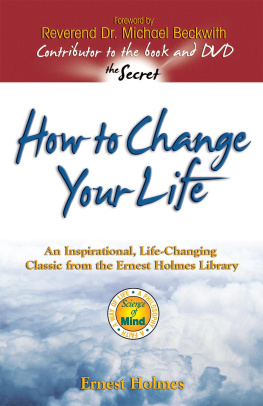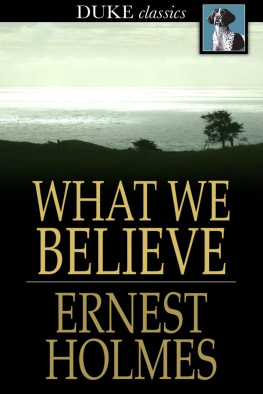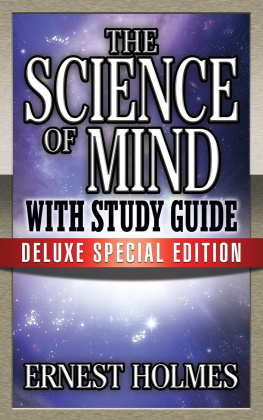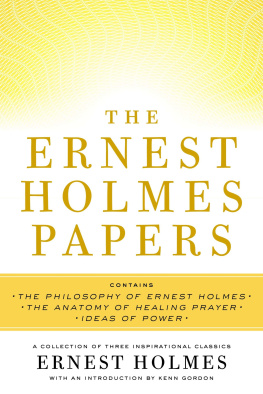Ernest Holmes - The Science of Mind
Here you can read online Ernest Holmes - The Science of Mind full text of the book (entire story) in english for free. Download pdf and epub, get meaning, cover and reviews about this ebook. year: 2013, genre: Science. Description of the work, (preface) as well as reviews are available. Best literature library LitArk.com created for fans of good reading and offers a wide selection of genres:
Romance novel
Science fiction
Adventure
Detective
Science
History
Home and family
Prose
Art
Politics
Computer
Non-fiction
Religion
Business
Children
Humor
Choose a favorite category and find really read worthwhile books. Enjoy immersion in the world of imagination, feel the emotions of the characters or learn something new for yourself, make an fascinating discovery.

- Book:The Science of Mind
- Author:
- Genre:
- Year:2013
- Rating:5 / 5
- Favourites:Add to favourites
- Your mark:
- 100
- 1
- 2
- 3
- 4
- 5
The Science of Mind: summary, description and annotation
We offer to read an annotation, description, summary or preface (depends on what the author of the book "The Science of Mind" wrote himself). If you haven't found the necessary information about the book — write in the comments, we will try to find it.
The Science of Mind — read online for free the complete book (whole text) full work
Below is the text of the book, divided by pages. System saving the place of the last page read, allows you to conveniently read the book "The Science of Mind" online for free, without having to search again every time where you left off. Put a bookmark, and you can go to the page where you finished reading at any time.
Font size:
Interval:
Bookmark:
The Science of Mind
A Complete Course of Lessons in the Science of Mind and Spirit
by Ernest Shurtleff Holmes
- 1926 -
Digital Edition 2013
CONTENTS
PEACE BE UNTO THEE, STRANGER
Peace be unto thee, stranger, enter and be not afraid.
I have left the gate open and thou art welcome to my home.
There is room in my house for all.
I have swept the hearth and lighted the fire.
The room is warm and cheerful and you will find comfort and rest within.
The table is laid and the fruits of Life are spread before thee.
The wine is here also, it sparkles in the light.
I have set a chair for you where the sunbeams dance through the shade.
Sit and rest and refresh your soul.
Eat of the fruit and drink the wine.
All, all is yours, and you are welcome.
FOREWORD
In presenting these lessons on Mental Science, I do not claim to have discovered any new Truth. The Truth has been known in every age by a few; but the great mass of people has never even dreamed that we live in a mental and spiritual world. To-day, however, there is a great inquiry into the deeper meaning of life because the race has reached a state of unfoldment where a broader scope is possible.
These lessons are an attempt to put into the spoken word and into print some of those great truths known to the enlightened of all ages.
To suppose that the Creative Intelligence of the world would create man in bondage and leave him bound would be to dishonor that Creative Power which we call God. On the other hand, to suppose that God could make man as an individual, without leaving him to discover himself, would be to suppose an impossibility. Individuality must be spontaneous and can never be automatic. The seed of freedom must be hid within the shell of the human. But, like the Prodigal of old, man must make the great discovery for himself. Although the journey may at times seem hard and the burden too great to bear, man still feels within a subtle sense, a mystical presence, a divine Reality. Thus, the inherent nature of himself is forever seeking to express itself in terms of freedom. We will do well to listen to this inner voice, for it tells us of a life wonderful in its scope, of a love beyond our fondest dreams, of a freedom which the soul craves.
But the great love of the universe must be one with the great law of Its own Being, and we must approach love through the law.
This, then, is the teaching, Love and Law. As the love of God is perfect, so the law of God is also perfect. We must understand both. "Who hath ears to hear, let him hear."
I wish to express my appreciation to the authors whose names are mentioned following the different lessons in this course of instruction, as well as to many others whose names are not mentioned. The Truth comes to us from all sources, and our understanding of it is the result of the time, thought and effort of thousands of people who have given their lives to its study.
I wish to express special appreciation to Miss Anne Shipman, of Boston, Mass., without whose untiring efforts it is not probable that these manuscripts would have ever been gotten in shape for publication; and to my mother whose great faith in these teachings has inspired me with the hope and the belief that they may be of benefit to those who study them.
- E.S.H.
YOURSELF
Oh, weary heart, laden with earth's weight and care,
Oh, feet, stumbling on the way, bleeding and bare,
Oh, arms outstretched, and hands upheld in prayer,
Oh, back, which so oft has felt the lash and rod,
Oh, soul, which cries aloud for the living God,
Oh, life, struggling to free itself from the clod;
Know this: there is no power from without,
Yourself must answer every fear and meet all doubt
With some divine, indwelling power
Which you yourself, upon yourself, shall shower;
And giving, take, and taking, give
Unto that life which you, yourself, shall live.
Part I: The Evolution of Man's Thought
INSTINCTIVE MAN
If we traced man's history back into the dim past we should come to a place where he did not consciously know himself. We should come to a place where Instinctive Man alone existed; for the self-conscious man had not yet evolved.
Nothing can be more apparent than that man, as he now appears, is the result of growth and unfoldment. But in order to unfold, he had to have something from which to unfold, and since he is intelligent, he must have unfolded from an intelligent cause.
Instinctive Man, then, means that Inner Something, or Life, which we do not see but which is, of course, there. We might say that Instinctive Life is God in man, or the idea of God, working through man. But if Instinctive Man is an idea of God, why is he not perfect? The answer is that he is perfect, but that as soon as individuality is evolved he must be left alone to discover himself. Even God could not make a mechanical Individuality. If man is created with the attributes of self-choice and free will, he must be let alone to make the great discovery for himself.
NATURE WAITS ON MAN'S SELF-RECOGNITION
We note, that from the day when Instinctive Life brought man to the point of self-choice, it let him alone, and from that day Instinctive Life has waited on man's unfoldment. It is true that during all this time it has carried on the automatic functions of the body and has even silently told man what to do; but it has let him alone in all other ways. It may, and must, hold man as a perfect being, but it also must let him discover this fact for himself. During all of this time, however, Instinctive Life, or God, must be silently waiting for the great discovery to be made and must always be ready to respond to man's advancement. We note this to be true along the line of man's progress. For instance, consider the discovery of any of nature's forces; we know that they must have always existed; but, so far as man is concerned, they exist to him only after he has discovered, and learned how to make use of them. Electricity was a reality in the universe when Moses led the Children of Israel from the land of Egypt, but neither Moses nor any of his followers knew anything about it, and so they did not receive any benefits from its use. This is true of any and all of the natural laws; they always existed, and as soon as understood may be used. In this way, Instinctive Life waits upon man's discovery of the natural laws and his discovery of himself and his relationship to the great Whole.
If this is so evidently true of all the forces in the natural world we must expect to find the same thing to be true of those inner and finer forces within man. The unfoldment of these inner and finer forces through man is what we call his evolution.
THE FIRST GREAT DISCOVERY
The first great discovery that man made was that he could think. This was the day when he rose from the ground and said, "I AM." This marked the first great day of personal attainment; and from that day man became an individual and had to make all further progress himself; any compulsory evolution stopped when man became an individual, and from that day he had to work in conscious union with Nature and Her forces; but he did not have to work alone, for Instinctive Life has always been with him and will never depart from him. Instinctive Life desires that man shall express more, and yet more, of its own limitless possibilities.
Man is evolving from an Infinite basis; behind him is the great Unknown but not the great unknowable; for the unknown becomes known through man, and whatever more Instinctive Life is to do for him must be done through him. Nature must work through man in order to work for him. This is true all along the line of life and endeavor.
The first great discovery of man was that he could think, plan and execute. As the result of this discovery he has built up a great civilization and all that goes with it. He has harnessed electricity to his inventions, tied steam and compelled it to do his bidding. He has laid waste forests, built cities, made the desert to bloom, and has thrown the lines of his commerce around the globe; indeed, he has seemed to possess the earth.
Font size:
Interval:
Bookmark:
Similar books «The Science of Mind»
Look at similar books to The Science of Mind. We have selected literature similar in name and meaning in the hope of providing readers with more options to find new, interesting, not yet read works.
Discussion, reviews of the book The Science of Mind and just readers' own opinions. Leave your comments, write what you think about the work, its meaning or the main characters. Specify what exactly you liked and what you didn't like, and why you think so.





